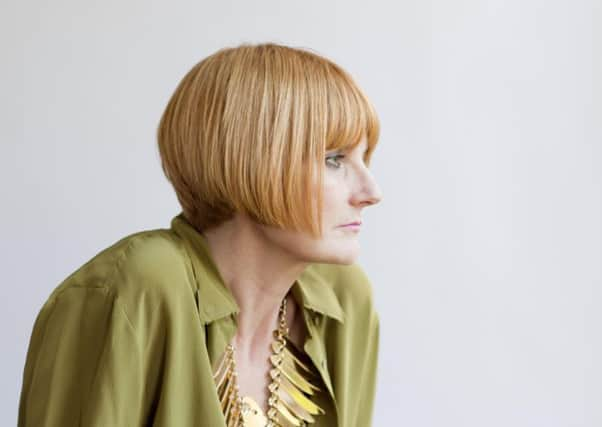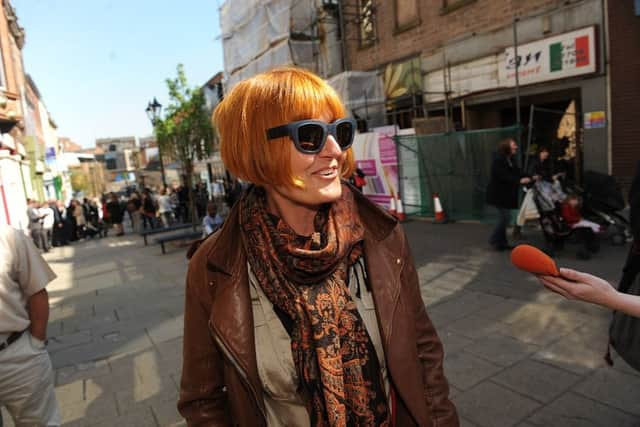Mary Portas: Rise of the Queen of Shops


MARY Portas made her name as a straight-talking, no-nonsense businesswoman and has become synonymous with her adopted sobriquet, the Queen of shops.
From starting out as a window dresser at Harrods she has risen up through the retail world and was the obvious person for David Cameron to turn to for advice on how to save the high street.
Advertisement
Hide AdAdvertisement
Hide AdBut her successful career belies a story of childhood heartache and hardship. It was after being interviewed by Kirsty Young on the BBC’s Desert Island Discs that prompted her to confront this painful chapter in her life.


“She asked me about my childhood and I realised that there was still this pain deep down inside of me,” she explains.
Mary began writing “little vignettes” that were to form the starting point of her memoir, Shop Girl. The book describes her rise from humble origins to becoming one of the world’s leading advisers on retail strategy and tomorrow she will be talking about her life and career at the Off The Shelf festival in Sheffield.
She found writing the book a cathartic experience. “It was a real eye opener,” she says. “I learned to like myself. I’d always thought I was a naughty child and I realised that actually I was a good kid... I was grieving for those childhood years I lost.”
Advertisement
Hide AdAdvertisement
Hide AdMary grew up as plain Mary Newton, one of five siblings growing up in a big, noisy Irish end-of-terrace in Watford. She remembers her childhood up to her mid-teens with fondness. “I came from a family where you expressed yourself through what you wore and for me the music of Bowie and Bolan was a big part of that. In the 70s and 80s rock music had a big influence on fashion,” she says.
However, this ordinary childhood began to collapse around her when her mother, the loving linchpin of the family, died from meningitis when Mary was just 16.
It threw the family into turmoil. Her father, a bus conductor-turned-sales manager, couldn’t cope and he left the family home for another woman soon afterwards, Mary gave up a place at Rada – she had always wanted to be an actress – to look after her younger brother. Although this period of her life was fraught it also made her more resilient as she was forced to stand on her own two feet. “I had to work in order to survive,” she says.
Mary went to a local art college, gaining some work experience at Harvey Nichols. But on leaving college, she badgered Harrods’ personnel department for an interview, even though no job had been advertised, ringing every day for weeks until she was finally granted one – and got a window dresser’s job.
Advertisement
Hide AdAdvertisement
Hide AdShe went on to marry chemical engineer Graham Portas in 1990 and they had two children. The couple divorced in 2003, but remain good friends. Today, she lives in London with her wife, fashion journalist Melanie Rickey.
She has become a familiar face to TV viewers through the BBC series Mary Queen of Shops, but it was back in the early 90s, with the country in the grip of recession, that she first made her name in the retail world working for Harvey Nichols.
“At the time Harrods was this huge global brand, it was popular with tourists and everybody wanted to go there.” But while working for Harvey Nichols, she opted for a slightly different approach. “I thought I’d make it [Harvey Nichols] the coolest place to be and not worry too much about the products because I felt brands would want to come to us.”
She also introduced a bar, something new in a department store. “I wanted it to be the coolest bar in town and we started putting art in the windows and getting celebrity artists on board, and it worked because people talked about it.”
Advertisement
Hide AdAdvertisement
Hide AdMary says successful brands aren’t necessarily about being the best, or most fashionable. “It’s about having the right product in the right place... it’s about understanding your uniqueness and the importance of that.”
When she was starting out she was inspired by the late Anita Roddick, the environmental campaigner and founder of The Body Shop. Now, as a broadcaster, retail guru and businesswoman who runs her own marketing agency she, too, is a role model.
Given her impressive CV it was little surprise that in 2011 David Cameron commissioned her to produce the Portas Review, which subsequently outlined 28 recommendations to rescue failing streets.
It’s an issue that Mary is passionate about and she believes there are two key factors that have precipitated the decline of our high streets – one is the rise of big out of town supermarkets and giant retail parks, and the other is the dramatic growth in online shopping.
Advertisement
Hide AdAdvertisement
Hide AdSome people argue that high streets are constantly evolving and this is just the latest chapter in an ongoing story, but Portas believes more can be done to aid them. “In places like France, if a butcher’s shop closes you have to prove that there’s not another butcher who can take over first, and this is something we aren’t very good at doing.”
She would like to see politicians do more to support high streets. “Out of town businesses are able to offer free parking, but people have to pay for parking if they want to shop on the high street, how is that right?”
However, she has noticed a recent shift in people’s attitudes as more people embrace the growing independent shopping scene. “I think in the last couple of years or so the large supermarkets have started going back to having local stores because people don’t want to shop in the same way any more.”
In some of our big cities like Leeds, where the Trinity shopping complex has been a huge success since opening in 2013, there has been something of a renaissance.
Advertisement
Hide AdAdvertisement
Hide AdOur high streets were once at the beating heart of local communities and Mary is convinced they can be revived. “I read somewhere that the internet is the new home of communities and I thought ‘what a load of rubbish’. It’s just a collection of people, there’s no social infrastructure.”
She believes the high street plays a big part in people’s lives, and this is why it is so important. “In her book The Death and Life of Great American Cities, Jane Jacob writes that it’s the little things that are important, like picking up a newspaper from a local shop and bumping into someone you know in the street, dropping your kids at school and going to buy fresh bread.
“These sound trivial things but they aren’t. It’s about the way we live and the way we want to live.”
Mary Portas is appearing at the Crucible Theatre, Sheffield, tomorrow. For tickets call 0114 22 33 777. Her book Shop Girl: A Memoir, published by Doubleday, is out now.